15
ROSETTA GLYNN greeted me at the big wooden door when I returned on Saturday afternoon. She wore a look that I recognized: the look of someone with a story to tell, sizing up her audience with bright, curious eyes. She nodded, smiled a tiny smile, and led me to the kitchen, where, I expected, she would tell me about the night the Nevsky mansion burned. Everyone else had.
She took a seat at a round table that still held the remains of lunch. No one else was around.
“Have something,” she said.
She waved her hand across the table and finished the gesture by letting her hand fall limply onto a cigarette pack, which she lifted as if it were considerably heavier than the cigarette packs my parents had around the house. She took a cigarette from the pack, and while she went through the business of lighting it, I took a roll from a pile of several on an earthenware platter. The roll had an unfamiliar shape. I took a bite. It had an unfamiliar flavor.
“Mm, this is good,” I said. “What is it?”
She exhaled and squinted through the smoke. An odd look came over her face, part grimace and part smile, a look of grudging reminiscence, as if she couldn’t keep herself from remembering, though she would really rather not.
“Well,” she said, and shrugged, “it’s a roll.”
“Mm,” I said, and I took another bite.
“To you,” she said, “it’s a roll.” She looked at me and raised an eyebrow.
“Uh-huh,” I said.
“But it’s more than that, you know,” she added, and she winked and waved away some of the smoke. “Much, much more.” She paused. “To me—to me, it’s hope.”
Here we go, I thought.
She got up from the table with a weary sigh and went to a cupboard over the sink, where she got a fancy bottle with a circular body. I tried to read the label, but the words all seemed to be misprinted or backward, and the largest word was nearly obscured by an elaborate drawing of vines. As well as I could make it out, it seemed to say SLIVOVITZ, but that didn’t match any words I knew, so I assumed that I was wrong. From another cupboard, she got a tiny tumbler, no bigger than a shot glass, but thin and fragile and delicate and ladylike. She returned to the table, set the bottle and the tiny glass down, sighed, smiled a queer, funny, endearing twisted smile, shook her head, sat, uncorked the bottle, filled the tiny glass, and set the bottle down beside the glass.
Then, apparently on impulse, she took another roll from the platter, broke it in half, and held the halves to her face. She drew a long breath, inhaling the aroma of the roll.
“Smell it,” she said.
I did as she had done. The aroma was wonderfully rich and yeasty, almost too much for me.
“That’s hope you smell,” she said. She put the roll back on the platter and said, “I’ll tell you why I say that.” She lifted the glass, took a sip, and said, “We had to get out, of course.” She looked for some sign of understanding from me. “You know,” she said.
I didn’t, but I nodded and said, “Mm.”
“The Fascists,” she said.
“Oh!” I said. “Yeah.” I knew who they were, in a way. They had been the bad guys in the war comics, the official enemies of our tribe, before the Gooks, Chinks, and Russkies came in.
“Yes, yes. That’s why. The Fascists. Andrew—but of course he wasn’t Andrew then—was a marked man, a very comical man, very funny. He was a cartoonist then, you know. A caricaturist. He was very popular—very, very popular. He was even in a nightclub, as an entertainer. He would go around and make pictures of people—not just the way someone would go around and sell you cigarettes or take your photograph. No, he was a performer, with a spotlight on him. Such a big man, you know.”
A smile, a sip.
[to be continued]
Have you missed an episode or two or several?
You can begin reading at the beginning or you can catch up by visiting the archive or consulting the index to the Topical Guide. The Substack serialization of Little Follies begins here; Herb ’n’ Lorna begins here; Reservations Recommended begins here; Where Do You Stop? begins here; What a Piece of Work I Am begins here; At Home with the Glynns begins here.
You can listen to the episodes on the Personal History podcast. Begin at the beginning or scroll through the episodes to find what you’ve missed. The Substack podcast reading of Little Follies begins here; Herb ’n’ Lorna begins here; Reservations Recommended begins here; Where Do You Stop? begins here; What a Piece of Work I Am begins here; At Home with the Glynns begins here.
You can listen to “My Mother Takes a Tumble” and “Do Clams Bite?” complete and uninterrupted as audiobooks through YouTube.
You can ensure that you never miss a future issue by getting a free subscription. (You can help support the work by choosing a paid subscription instead.)
At Apple Books you can download free eBooks of Little Follies, Herb ’n’ Lorna, Reservations Recommended, and Where Do You Stop? and What a Piece of Work I Am.
You’ll find overviews of the entire work in An Introduction to The Personal History, Adventures, Experiences & Observations of Peter Leroy (a pdf document), The Origin Story (here on substack), Between the Lines (a video, here on Substack), and at Encyclopedia.com.








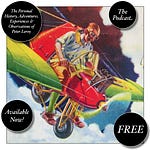
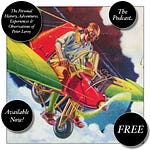
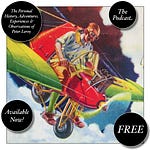
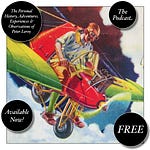

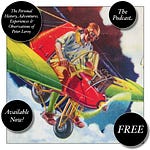
Share this post